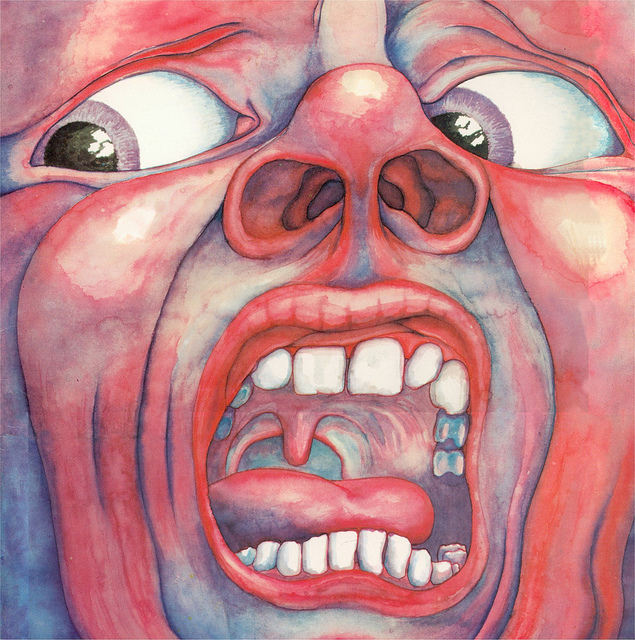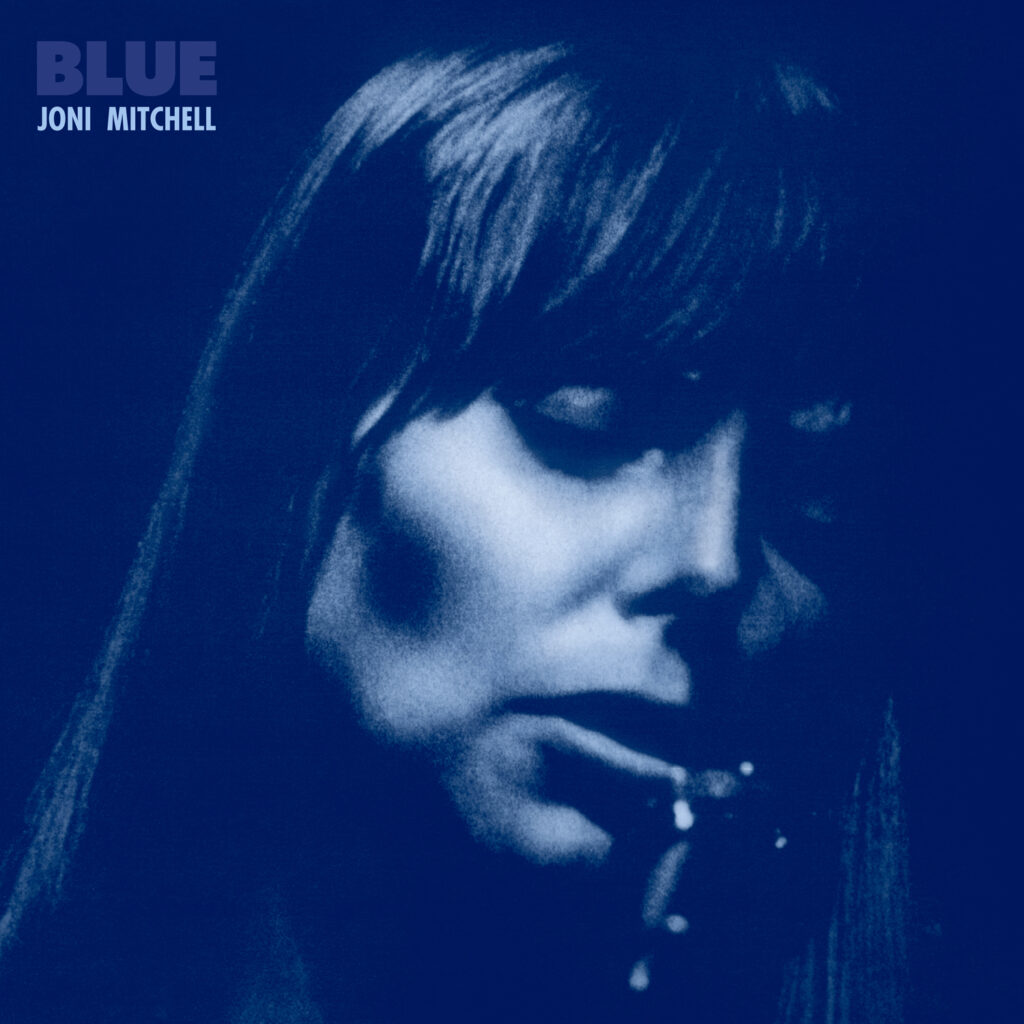King Crimson, ‘In The Court Of The Crimson King,’ 1969

The wall on which the prophets wrote
Is cracking at the seams
Upon the instruments of death
The sunlight brightly gleams
When every man is torn apart
With nightmares and with dreams
Will no one lay the laurel wreath
When silence drowns the screams
God listened In the Court of the Crimson King and saw that it was good. God divided Progressive Rock from the rest of the music.
1969 stands as a singular moment in the tapestry of music—a year where the cosmos of sound shifted irrevocably. The Beatles unveiled Abbey Road, their magnum opus; The Rolling Stones conjured the raw magic of Let It Bleed; Led Zeppelin birthed the thunder of hard rock with their first two titanic records. Miles Davis dissolved boundaries with In a Silent Way, while Frank Zappa’s Hot Rats sprawled like a surrealist dream. The Velvet Underground, reshaped and resolute, offered their haunting second act. Yet, towering above them all—a monolith of innovation—was King Crimson’s In the Court of the Crimson King. This was the moment progressive rock crystallized, not merely as a genre but as a realm of infinite possibility. And within that realm, this album reigns supreme: the greatest recorded work in history.
Only five tracks compose this masterpiece, yet each is a universe unto itself—diverse in tone, yet bound by an unshakable cohesion. One of the ways to read into In the Court of the Crimson King absolutely is that it’s about the Vietnam War. Vietnam was clearly an ongoing, pressing, and present topic of discussion, debate, and art at the time. 21st Century Schizoid Man is the most obvious thing pointed at power structures and deciphering their roles, their manic nature, and inhuman glance at war’s inherent suffering; with one amazing biting gripping line of lyric right after another. The track erupts like a scream in the dark. A weary organ gasp gives way to a riff that sears like napalm, its jagged edges honed by basslines like sledgehammer blows and drums that crack like gunfire. The verse channels this fury into staccato shards of dissonance, each syllable of “21st century schizoid man” a detonation. Then, the storm breaks into Fripp’s solo—a blade of sound, so sharp it feels surgical in its madness. The song writhes, lunges, and collapses in a freeform explosion—an opening salvo of pure, unhinged genius.
I Talk to the Wind is the stillness after the storm. A pastoral dreamscape, it floats on flute and gentle guitar, its lyrics aching with isolation: “I’m on the outside looking inside / What do I see? / Much confusion, disillusion / All around me.” The solo is a sigh, a moment of fragile beauty—necessary contrast to the chaos before and the cataclysm to come. Epitaph is a funeral march for the end of the world. Mellotrons weep like ghosts as Greg Lake’s voice carries the weight of prophecy: “The wall on which the prophets wrote / Is cracking at the seams.” The arrangement is a masterclass in tension—acoustic guitars shimmer like distant sirens, drums toll like a death knell, and every crescendo feels like the sky splitting open. By the time Lake laments, “Yes, I fear tomorrow I’ll be crying,” the song has carved its sorrow into your bones.
Moonchild drifts like a lullaby from another dimension. Its opening is delicate, almost alien—guitars glimmer like starlight, drums whisper like rainfall. Then, it dissolves into abstraction: vibraphones and plucked strings ripple like reflections in dark water. It is the album’s most elusive moment, a fleeting dream before the final reckoning. The Court of the Crimson King is the grand, grotesque finale. Mellotrons loom like ancient monoliths, their melodies both medieval and utterly inhuman. The chorus crashes in like a cathedral collapsing—choirs wail, drums strike like judgment, and Lake’s voice trembles with awe and terror. The false ending is a trickster’s grin, leading not to resolution but to a final, demented reprise—an organ howling like a damned jester before silence swallows it whole.
This album not only popularized progressive rock but also set the precedent for every major act that followed. The genre reached its peak in the ’70s—a decade undoubtedly shaped by the ’60s, yet for prog, that era was truly ushered in by In the Court of the Crimson King. What makes this album so remarkable is that it deserves acclaim purely on its own merits, yet its influence extends far beyond itself, shaping generations of music in its wake. To call it the most important rock album of all time isn’t hyperbole—it’s a reasonable claim. Launching something as monumental and enduring as progressive rock would be an achievement enough for most bands, yet King Crimson did it with their debut. That alone speaks to the album’s unparalleled brilliance. Nothing else has ever occupied quite the same space. A landmark in every sense, In the Court of the Crimson King remains one of the most unique and essential albums ever recorded.
Joni Mitchell, ‘Blue,’ 1971

“Richard, you haven’t really changed”, I said
It’s just that now you’re romanticising some pain that’s in your head
You’ve got tombs in your eyes, but the songs
You punched are dreaming
Listen, they sing of love so sweet, love so sweet
When you gonna get yourself back on your feet?
The more I come to realise how filthy and nasty this world can be, the more I appreciate progressive rock and also… the works of Joni Mitchell. What a weird mix.
Blue is not stagnant water—it is an everlasting river in motion, in flight, in wake, carrying the memories of millennia in its sparse, cornerstone pebbles. Blue is an introspective hot spring, simmering within a seaborne embrace, enveloping those willing to unfold its solitary story and valiant voice. Onlookers skim the surface, peering down through the lens of Traditional Folk, but Joni Mitchell defied the assumptions of what “folk” could mean. Mitchell is a guardian, a golden catalyst—a Valkyrie of her time, guiding generations toward a folksy Valhalla with Blue as her spearhead.
Yet, for all her legacy, she played for no one but herself. The term “singer-songwriter” once felt redundant—all music is personal, after all—but the fog lifted when I heard Mitchell’s voice, intimate and echoing, through my headphones. It made sense. She is a one-woman band, an eagle diving into the deep blue with her clawed chords and choruses. The ensemble behind Blue—Stephen Stills, James Taylor, Sneaky Pete Kleinow, Russ Kunkel—is content to linger in the margins, basking in the glow of Mitchell’s sunlit strumming and sky-clear voice. Henry Lewy’s production weaves them in like a will-o’-the-wisp, a spectral companion to her airy atmosphere. The backup vocals in Carey are intoxicating; the spritzed-up mix of This Flight Tonight—”Goodbye baby, baby goodbye, ooh, ooh, love is blind”—sparkles with playful ingenuity. The confessions whispered across Blue remind me of Jason Molina’s plight—how listeners clung to the gravel weight of his words when he longed for them to find the light within. Music is about belief. It is about the betterment of the human spirit.
And at its core, Blue embodies this truth: Though the album is Mitchell’s own, it would be foolish to dismiss the voices that believed in her, just as they did in Molina. That is the crux of creation. Even the most solitary indie records—those singer-songwriter soliloquies—are buoyed by some form of faith. Even the meekest voice finds resonance. Art deemed bleak by the masses is redeemed by the sheer act of its making—by the courage to speak, to exist. We are bound by our opinions, but art is not about the final product, nor the interpretations we wrench from it—it is about its very being. Blue stands as proof of what happens when people create for the sake of creation. No one treads this path without something to say—not even those who chase fame. Had Blue been ear-piercing, I still would have admired Mitchell for standing on that soapbox, for shining a spotlight on her truth. And isn’t that what we all must do?
Mitchell speaks her mind. Blue draws from the oral tradition of folklore—a word-of-mouth chronicle of turmoil and tenderness. My Old Man, Little Green, River, Blue, The Last Time I Saw Richard—these are the pillars of lived experience, weathered but unbroken. The life in Blue makes it an album both difficult and effortless to hear, like a well-worn sweater that never scratches. Sufjan Stevens’ Carrie & Lowell sits untouched on my shelf until I’m ready to weep; Mitchell, like Stevens, is a bruised voice sending fireworks into the night. She masters emotion’s flicker—how it darts through the psyche like a school of butterflies, how seasons shift before we’ve finished dinner, how the promise of spring lingers even in winter’s grip. There are lilies in the movement of her lips, tulips in the cadence of her confessions. She didn’t just document life—she made it more than it was.